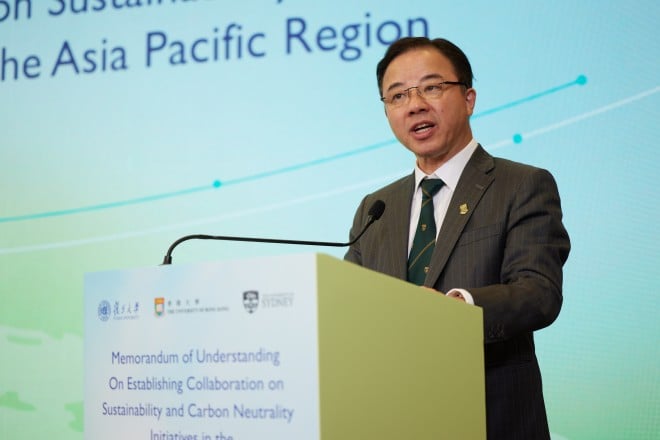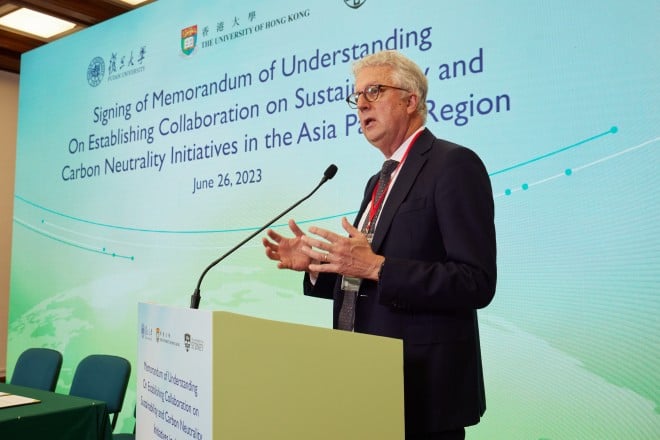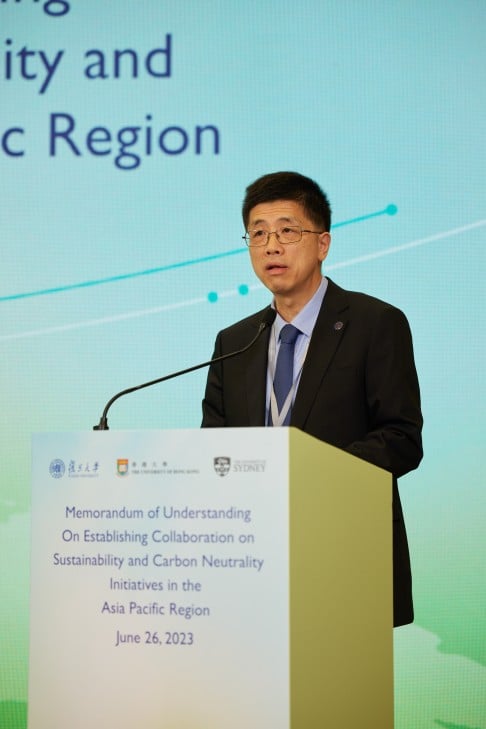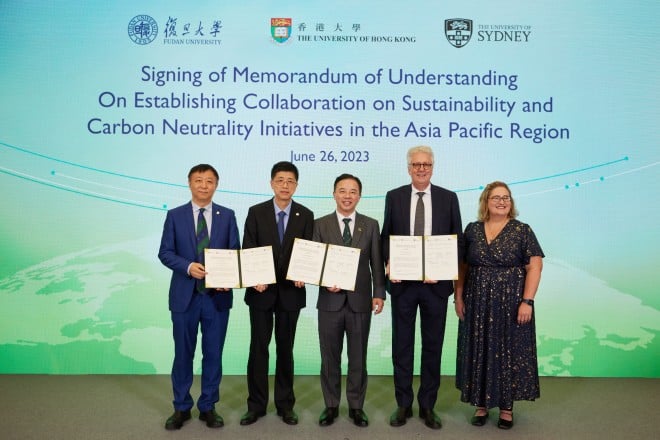As specified in the MoU, HKU, Fudan University and The University of Sydney will strive to formulate university-wide carbon neutrality targets. This collaborative effort will involve designing and implementing strategies to reduce carbon emissions and achieve carbon neutrality within their respective institutions.
The participating institutions will also co-organise regular round-table workshops and student exchange programmes, providing students with valuable opportunities to acquire knowledge and practical experience in environmental initiatives.
During his welcome remarks, Prof Xiang Zhang, President and Vice-Chancellor of HKU, stated that the MoU serves the pivotal role in enabling three universities in advancing university-wide carbon neutrality targets across respective institutions and leading research that brings sustainability and carbon neutrality throughout Asia-Pacific.

“It’s indeed an honour to witness and celebrate the beginning of a new chapter for HKU alongside our esteemed partners, Fudan University and The University of Sydney. We’re united by a common aspiration and shared goals in our commitment to sustainability and carbon neutrality,” said Prof Zhang.
“With the rich experience, insights and talents across our networks, we will establish a research mega-hub that connects and creates synergies across regions. Through the teaching and learning programmes under the MoU, our combined impact will reach far and wide,” he said.
Apart from research collaboration and knowledge sharing, Prof Zhang also highlighted the importance of proactive engagement with both the public and private sectors.
Recognising the commitment of the Hong Kong government to achieve net zero emissions by 2050, as well as the dual decarbonisation goals set by the central government for 2030 and 2060, he said HKU is eager to collaborate closely with all stakeholders across the public and private sectors to drive meaningful change.
“Hong Kong, including HKU, has a shared obligation and interest in reducing carbon emissions. The construction industry, for example, wants to lower emissions and costs. Some of the research works we are conducting can directly contribute to the development of sustainable solutions in areas such as energy efficiency, renewable energy integration and carbon capture technologies,” he said.
However, it is important to note that not all industries are at the same level of progress in addressing carbon emissions. While some industries, such as the banking sector, have shown great commitment to Environmental, Social and Governance (ESG) initiatives, including green finance, there are still areas where further collaboration is needed.
“Public organisations and private businesses have the potential to join us in research collaboration, especially considering the government’s mandate in this area. Universities should take the lead in driving these efforts forward, as we have the expertise and resources to make a significant impact,” said Prof Zhang.
Prof Mark Scott, Vice-Chancellor and President of The University of Sydney, also spoke at the ceremony. He said: “We will be looking to draw on the University’s multidisciplinary strength to engage researchers from medicine and health, climate change, sustainability and other areas, and from our strategic initiatives such as the Net Zero Initiative and Sydney Environment Institute.”

“I think it’s a particularly exciting development that we are looking to involve other partner universities in the project, to expand the partnership beyond China and Australia, in a way that really makes use of our networks and connections,” said Prof Scott.
Prof Lei Xu, Vice President of Fudan University, emphasised the importance of universities in the Asia Pacific region enhancing co-operation and working together to achieve a greener and more balanced future.

“Fudan University, in its commitment to creating a better world, has made significant contributions to addressing contemporary challenges. For example, in 2021, Fudan University established the first International Centre of Excellence on Risk Interconnectivity and Governance on Weather/Climate Extremes Impact and Public Health in the Chinese Mainland,” said Prof Xu.
When asked about the process of translating research results into real-world solutions, Prof Peng Gong, Pro-Vice-Chancellor (Academic Development) at HKU, emphasised the significant contribution of over 50 HKU professors who are actively engaged in addressing climate change-related issues.
“These experts come from a diverse range of disciplines, such as engineering, ocean science, marine biology, ecology, social science, finance, economics, just to name a few. With such a multidisciplinary approach, HKU is well-positioned to develop comprehensive solutions that address the complex challenges posed by climate change,” he said.
Collaboration across disciplines is crucial for achieving decarbonisation and addressing climate change risks, said Prof Kathy Belov, Pro Vice-Chancellor (Global and Research Engagement) at The University of Sydney.
She mentioned that a decade ago, The University of Sydney had already established multidisciplinary institutes (MDIs) to tackle these significant challenges. These initiatives aim to foster collaboration among industries, community interests, and government entities.

Stay connected with us on social media platform for instant update click here to join our Twitter, & Facebook
We are now on Telegram. Click here to join our channel (@TechiUpdate) and stay updated with the latest Technology headlines.
For all the latest Education News Click Here
